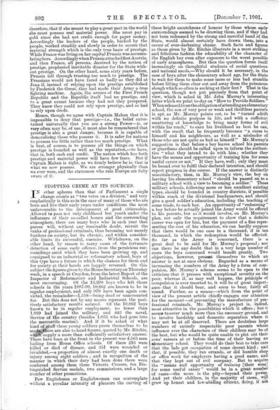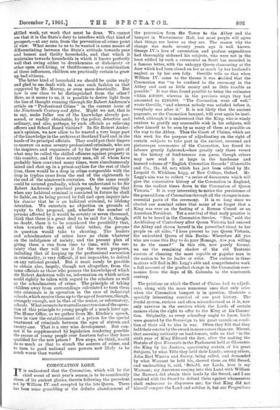• STOPPING CRIME AT ITS SOURCES.
IN other spheres than that of Parliament a single change counts as "two votes on a division," and very emphatically is this so in the case of many of those who are born and live their early years under conditions the most unfavourable to the development of good citizenship. Allowed to pass not only childhood but youth under the influences of their so-called homes and the surrounding atmosphere, there are many boys who in each year that passes will, _without any reasonable doubt, recruit the ranks of professional criminals, thus becoming not merely burdens on _society, but its chronic, and within consider- able limits its successful, enemies. Withdrawn, on the other hand, by reason in many cases of the fortunate ' detection of some early offence, from the pernicious sur- roundings amid which they have been growing up, and consigned to an industrial or reformatory school, boys of this type have a future in which the chances for them and for society at their hands are happily reversed. On this subject the figures given by the Home Secretary on Thursday week, in a speech at Croydon, from the latest Report of the Inspector of Reformatory and Industrial Schools, are most encouraging. Of the 13,390 boys who left those schools in the years 1897-99, 10,862 are known to be in regular employment, and only 970 have been again con- victed, the remainder-1,558—being dead or unaccounted for. But this does not by any means represent the posi- tively satisfactory results secured. Of the 10,862 boys known to be in regular employment, no fewer than 1,939 had joined the military, and 443 the naval, Service of the country (besides 1,033 who had gone into the mercantile marine). And. if it be asked of what kind o stuff these young soldiers prove themselves to be ere are also to hand figures, quoted by Mr. Ritchie, N% hie a supply a more than sufficiently satisfactory answer. There have been at the front in the present war 4,565 men hailing from Home Office schools. Of these 216 were killed or died of disease. and 351 were wounded or invalided,—a proportion of almost exactly one death or injury among eight soldiers ; and in recognition of the manner in which their duty had been done there were conferred among them three Victoria Crosses, ten Dis- tinguished Service medals, two commissions, and a large number of other promotions.
Few Englishmen or Englishwomen can contemplate , without a. Peculiar intensity of pleasure the Carving of 1 these bright escutcheons of honour by those whose early surroundings seemed to be drawing them, and if they had not been redeemed by the strong and merciful hand of the State, would almost. certainly have drawn them, into a career, of ever-darkening shame. Such facts and. figures as those given by Mr. Ritchie illustrate in a most striking and felicitous fashion the educability of the character of the English boy even after exposure to the worst possible of early atmospheres. But then the question forces itself increasingly on thoughtful students of social questions and national needs,—Why should it be necessary, in the case of boys after the elementary school age, for the State to wait for them to make some more or less bad stumble before lifting them clear out and away from the poisonous slough which so often is sucking at their feet ? That is the question, though not put precisely from that point of view, which is asked in Mr. John Murray's interesting letter which we print to-day on "How to Provide Soldiers.' When released from the obligation of attending an elementary school, the son of very poor or weak and thriftless parents is apt, as Mr. Murray points out, to be "turned adrift with no definite purpose in life, and with a sufficient smattering of knowledge to bring, many forms of evil within his reach," to earn his livelihood as best he can, with the result that, he frequently becomes "a curse to himself and his neighbours, as well as a misleader of those who are not quite as bad as himself." Mr. Murray's suggestion is that before a boy leaves school his _parents or guardians should be called upon to inform the authori- ties "what they intend to do with him; whether they have the means and opportunity of training him 'for, some useful careeror not." If they have, well; only they, must be bound over to fulfil their declared intention, and should report progress in due course. If the answer is distinctly unsatisfactory, then, in Mr. •Murray's view, the boy, on leaving his elementary school -" should ,be passed on to a military school with a view to becoming a soldier." These military schools, following more or less excellent existing types, should be founded in country districts, if possible within reach of the divisional headquarters, and should give a good soldier's education, including the teaching of some trade, to each boy. An opportunity of "redeeming" a boy before he actually joined the Army would be offered to his parents, but as it would involve, on Mr. Murray's plan, not only the requirement to show that a definite career was open for him, but the payment of a fine repre- senting the cost of his education, we can hardly suppose that there would be one case in a thousand, if in ten thousand, in which the redemption would be effected. So far as the Army is concerned, there is a great deal to be said for Mr. Murray's proposal ; nor can there be any doubt that in a very large number of cases the boys concerned. would benefit greatly. Two objections, however, present themselves to which an answer is not at once obvious. Regarded as a means of increasing the numbers of the Army, by a form of com- pulsion, Mr. Murray's scheme seems to be open to the criticism that it presses with exceptional severity on the poor, whereas if, as may well happen, the principle of compulsion is ever resorted to, it will be of great import- ance that it should bear, and seem to bear, fairly all round. Further, as a means—which from the point of view of the present article chiefly engages our attention for the moment—of preventing the manufacture of pro- fessional criminals, Mr. Murray's project is, indeed, most attractive in the possibilities which it offers ; but it seems to cover much more than the necessary ground, and to involve hardship and domestic separation where it may not be at all deserved. There are doubtless large numbers of entirely respectable poor parents whose influence over the characters of their children may be of the best, but who would be quite unable to plot out their sons' careers at or before the time of their leaving an elementary school. They would do their best to take care that the lads got occupation of some decent kind ; and. that, if possible, they ran errands, or did. humble shop or office work for employers having a good name, and that they kept out of evil company. But to acquire the "means and opportunity of training [their sons] for some useful career" would be in a great number of eases—the more is thepity—beyond their power. And yet their children, in tie majority of cases, will grow up honest and law-abiding citizens', doing, if nOt skilled work, yet work that must be done. We cannot esie that it is the State's duty to interfere with that kind of prospect,—at any rate, from the prevention-of-crime point of view. What seems to us to be wanted is some means of differentiating between the State's attitude towards poor and honest and thrifty households, and, that which it maintains towards households in which it knows perfectly well that owing either to drunkenness or dishonesty or other open evil-living, or thriftlessness, or a combination of these influences, children are practically certain to grow up bad citizens. The latter kind of household we should be quite ready and glad to see dealt with in some such fashion as that suggested by Mr. Murray, or even more drastically. But how is one class to be distinguished from the other? Here, as it seems to us, it is possible to derive light from the line of thought running through Sir Robert Anderson's article on "Professional Crime" in the current issue of the Nineteenth Century and After. Might we not, that is to say, make fuller use of the knowledge already pos- sessed, or readily obtainable, by the police, detective and ordinary, and also, perhaps, by such officials as relieving officers and School Board visitors ? In Sir Robert Ander- son's opinion, we now allow to be wasted a very large part of the knowledge in the archives at ScotlandYard and in the heads of its principal officials. They could put their fingers to-morrow on some seventy professional criminals, who are the inspirers and organisers of by far the greater part of what may be called the skilled offences against property in this country, and if these seventy men, all of whom have probably been convicted many times, were simultaneously seized and shut up in a prison-asylum for the rest of their lives, there would be a drop in crime comparable with the drop in typhus cases from the end of the eighteenth to the end of the nineteenth centuries. Or the same result could be secured gradually, which we understand to be Sir Robert Anderson's practical proposal, by enacting that when any habitual criminal is convicted in future he shall be liable, on its being proved by full and open inquiry into his dossier that he is an habitual criminal, to lifelong detention. We entertain no objection on grounds of equity to this proposal, and, whether the number of persons affected by it would' be seventy or seven thousand, think that there is a great deal to be said for it, though, no doubt, there is to be considered the possibility that, when towards the end of• their tether, the persons in. question would take to shooting. The leaders and schoolmasters of crime have no claim whatever on the indulgence of society, and the present plan of giving them a run from time to time, with the cer- tainty that they will use it for the worst purposes, including that of keeping up the professional succession in criminality, is very difficult, if not impossible, to defend on any rational ground. But it must surely be possible to obtain also, largely, though not altogether, from the same officials as those who possess the knowledge of which Sir Robert Anderson tells us, information on which action could rightly be taken with regard to the scholars as well as the schoolmasters of crime. The principle of taking children away from surroundings calculated to turn them into criminals is in operation in the case of industrial schools, which receive them up to the age of fourteen, though, strangely enough, not in that of the senior, or reformatory, schools. What seems to be wanted is an extension of the opera- tion of this principle to young people of a much later age. The Home Office, as we gather from Mr. Ritchie's speech, have in view the establishment of a prison for the special treatment of criminals between the ages of sixteen and twenty-one. That is a very wise development. But can- not it be supplemented by legislation rendering possible the rescue of young people over fourteen before they have qualified for the new prison ? Few steps, we think, would do so much as that to stanch the sources of crime, and to turn to good national uses powers now likely to be much worse than wasted.































































 Previous page
Previous page